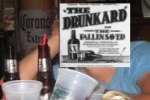On Daybreak last week they were discussing whether or not individuals should be responsible for paying for their own care if when drunk they need medical attention. The reasoning was that it’s self-inflicted. With resources being as tight as they are, should we drain NHS money on self-inflicted injury or states of ill health? That could raise the argument that individuals pay for obesity and smoking related issues as well – but maybe that’s another blog!

There was also an article in The Telegraph detailing a solution for people who drink and get so intoxicated they can’t look after themselves. They would end up in what they are calling ‘drunk tanks’, until they sober up.
These tanks will be privately run and could cost the individual up to £400 before they are allowed to leave. It sounds like “clamping” for humans. This initiative has the backing of some police and crime commissioners who believe that it would act as a deterrent for people who go out binge drinking at the weekend, and free up police officers to be able to deal with real crime. In the words of Adrian Lee, the Chief Constable of Northamptonshire and the Association of Chief Police Officers, “I do not see why the police service or the health service should pick up the duty of care for someone who has chosen to go out and get so drunk they cannot look after themselves.”
With Christmas looming this matter is going to get worse. What happens in the street usually has an effect in the workplace. How far can employers get involved and help alleviate the pressure on the public services? After all, they are doing it in their own time, Do we, should we, as employers have a say in how people behave?
Some may argue that alcohol dependency is an illness and frame their policies around rehabilitation. This approach is admirable and is used to protect workers; encouraging employees to seek treatment.
But what about a binge drinker who’s banged up in the ‘drunk tank’ and doesn't turn up for work on Mondays? Or is so hung over after a weekend session they are physically incapable of carrying out their duties, and risk being a danger to themselves and others. There’s also the question of driving while driving. In some cases we may be vicariously liable.
So what do you do? If someone comes to work who is not fit because he is either still under the influence, or suffering the effects of too much alcohol, explore the facts through the disciplinary process. I can remember the marketing team in one company I worked with who went out for their night out just before Christmas. They stayed out until 4pm in the morning and from the reek of stale alcohol in the office next day, it was clear they hadn't been drinking tea. Not only did they look awful and smell awful, they were so debilitated that they were a risk to the business and road users.
This is a matter of conduct and needs to be dealt with. It may also give employees the swift ‘kick in the ankle’ needed to realise they can’t carry on the way they are, especially if they understand they could lose their job if they do. In doing so employers may have in some way alleviated the number of people rolling around the streets on a weekend!
If you need help with your disciplinary process and procedure give us a call.
Russell HR Consulting provides expert knowledge in HR solutions, employment law training and HR tools and resources to businesses across the UK.
Subscribe to our free monthly HR newsletter. Russell HR Consulting employment law newsletters are emailed automatically to our ever-growing number of subscribers every month.
Latest blog posts
- Is There a Santa Clause?
06 / 12 / 2023
- Lend Us a Hand!
22 / 11 / 2023
- What Happens When There is a Clash in Protected Characteristics?
17 / 10 / 2023
- Encouraging a Healthy Workforce 2
21 / 09 / 2023
- Encouraging a Healthy Workforce
23 / 08 / 2023
- What a Disaster - (But We Have a Cunning Plan!)
20 / 07 / 2023
- It’s Time We Stiffened the Sinews
14 / 06 / 2023
- Why Is It So Important to Develop Emotional Resilience?
16 / 05 / 2023
- When is a discretionary bonus not discretionary?
20 / 04 / 2023
- Recovering Training Costs 15 / 03 / 2023
